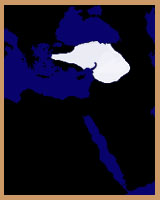The Hittites were an ancient Anatolian people whose empire was centered around their capital, Hattusa. The kingdom of the Hittites is coloured white on the map to the left.

Mursili II (Mursilis II) was the son of Suppiluliuma I (one of the most powerful rulers of the Hittite Empire during the New Kingdom). He was Chief of the Royal Bodyguards during the brief reign of his brother, Arnuwanda II and then became king of the Hittites in his own right. He also compiled his father’s biography, and in it he refers to correspondence with Egypt and in particular the widow of a pharaoh. In the biography he records the receipt of a letter from the widow of pharaoh; as follows:
While my father (Suppiluliuma I) was in the country of Karkamis (near the modern border of Turkey and Syria) he sent Lupakkish and Teshub-Zalmash to the country of Amqa. They left; they ravaged the country of Amqa and brought back to my father prisoners and cattle large and small.
When the people of Misra (Egypt) learned of the destruction of Amqa, they were afraid, for to make matters worse their master, Nibhururia, had just died and the widowed queen (literally “Dakhamunzu”) of Egypt sent an ambassador to my father and wrote to him in these terms: “My husband is dead and I have no son. People say that you have many sons (or many grown up sons). If you send me one of your sons he will become my husband for it is repugnant to me to take one of my servants (or subjects) as a husband.
When my father learned this he called together the council of the great [and said to them] “since the most ancient times such a thing has never happened before.” He decided to send Hattu-Zittish, the chamberlain, [saying] “Go, bring me information worth believing. They may try to deceive me; and it is possible that they may have a prince, so bring me back information I can believe.”
… Because my father had instructed Hattu-Zittish when he went to the country of Egypt as follows: “Perhaps they have a prince, they may be trying to deceive me and do not really want one of my sons to reign over them”.
The Egyptian queen answered my father in a letter in these words: “Why do you say ‘They are trying to deceive me?’ If I had a son, should I write to a foreign country in a manner humiliating to me and to my country? You do not believe me and you even say so to me! He who was my husband is dead and I have no son. Should I then perhaps take one of my servants and make of him my husband? I have written to no other country, I have written to you. They say that you have many sons. Give me one of your sons and he will be my husband and lord of the land of Egypt.”
Because my father was generous, he granted the lady’s request and decided to send his son.
It seems that the Hittite king was as good as his word, but his son died (possibly the victim of foul play) before the match could be made. The Hittite archives also hold a letter written by Suppiluliuma I to the pharaoh of Egypt (possibly Ay, the successor of Tutankhamun) after the “disappearance” of the prince.
…. I was ready to send my son to be king. But you were already on the throne and I did not know. Concerning what you have written to me: “Your son has died, but I have not caused him any ill.”
When the queen of Egypt wrote me again, you did not … But if you had ascended to the throne in the meanwhile, you should have sent my son back to his home … your servant Hani holds us responsible … What have you done with my son? Concerning the fact that no blood has been spilled between us before: the blood spilled since between us is not right….
Nibhururia is generally thought to be the Hittite version of Nubkheperure, the Prenomen of Tutankhamen, but it is also possible that Nibhururia was Akhenaten who was usually known as Napkhururia in Semitic sources. The general consensus remains that Nibhururia was Tutankhamen.
Dakhamunzu is thought to derive from the phrase “TA Hmt nsw” (Tahemnesu) which is translated as the “wife of the king”, however, we cannot confirm which queen wrote to Suppililiuma. The most likely is Ankhesenamun, the wife of Tutankhamun.
The Hittite prince is not named, but most scholars agree it was probably Zannanza, as a badly damaged inscription records Suppililiuma grieving for his son Zannanza.
This correspondence is considered by many to be evidence that Ay (possibly with the assistance of Horemheb) killed the son of the Hittite king so that he could force Ankhesenamun to marry him and thus seize the throne of Egypt. It is frequently suggested that Ay may have also arranged the murder of Tutankhamen in order to gain the throne, although recent medical findings do not offer much support for the idea that Tutankhamen was murdered.
In any case, the suspicious death of the Hittite prince resulted in hostilities between Egypt and the Hittites, which did not come to an end until Ramessess II signed a treaty with the Hittites following the Battle of Kadesh.
Bibliography
- DesRoches-Noblecourt, Christiane (1963) Tutankhamen, Life and Death of a Pharaoh
- Bryce, Trevor (2003) Letters of the Great Kings of the Ancient Near east
Copyright J Hill 2016